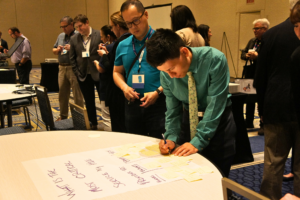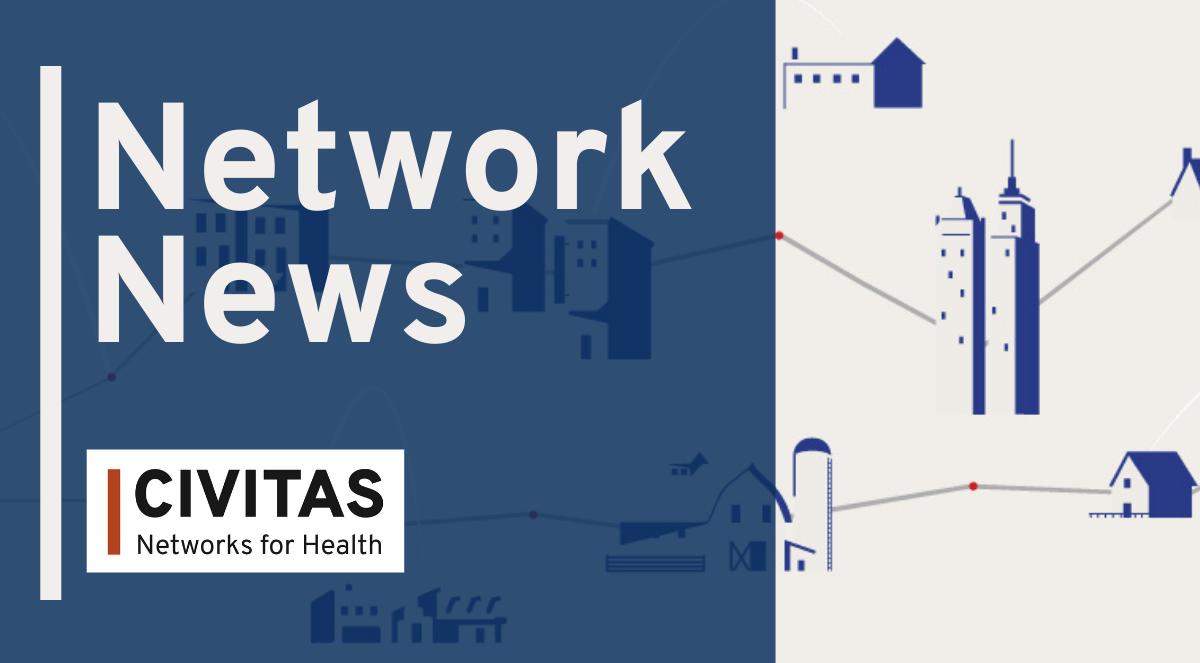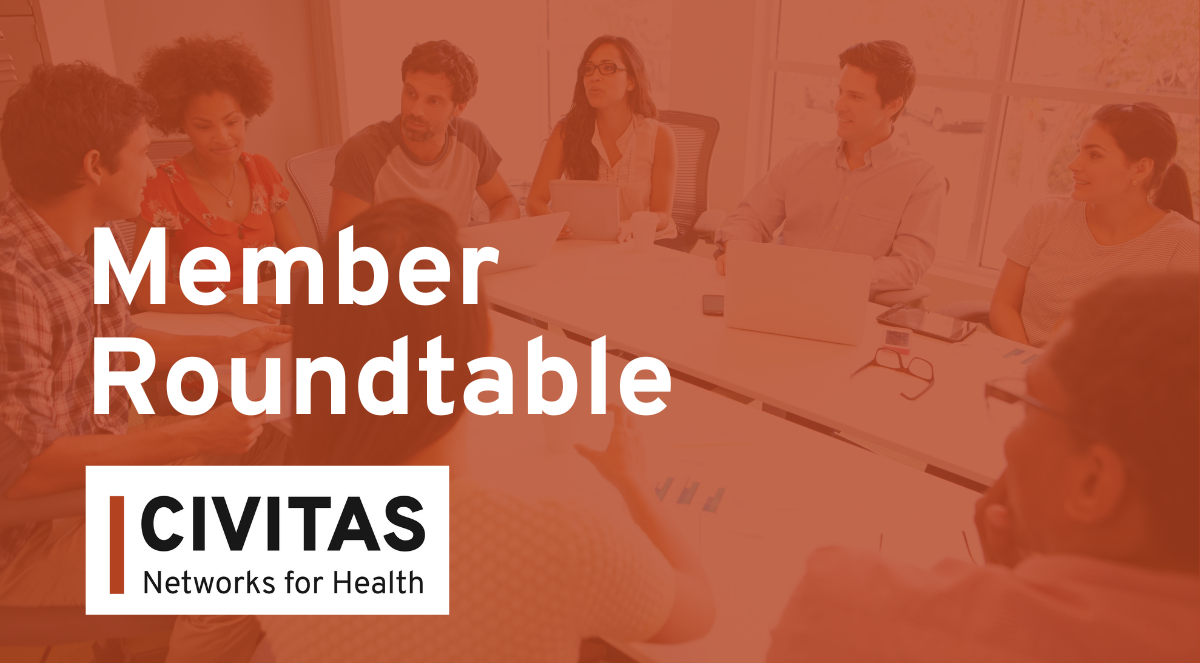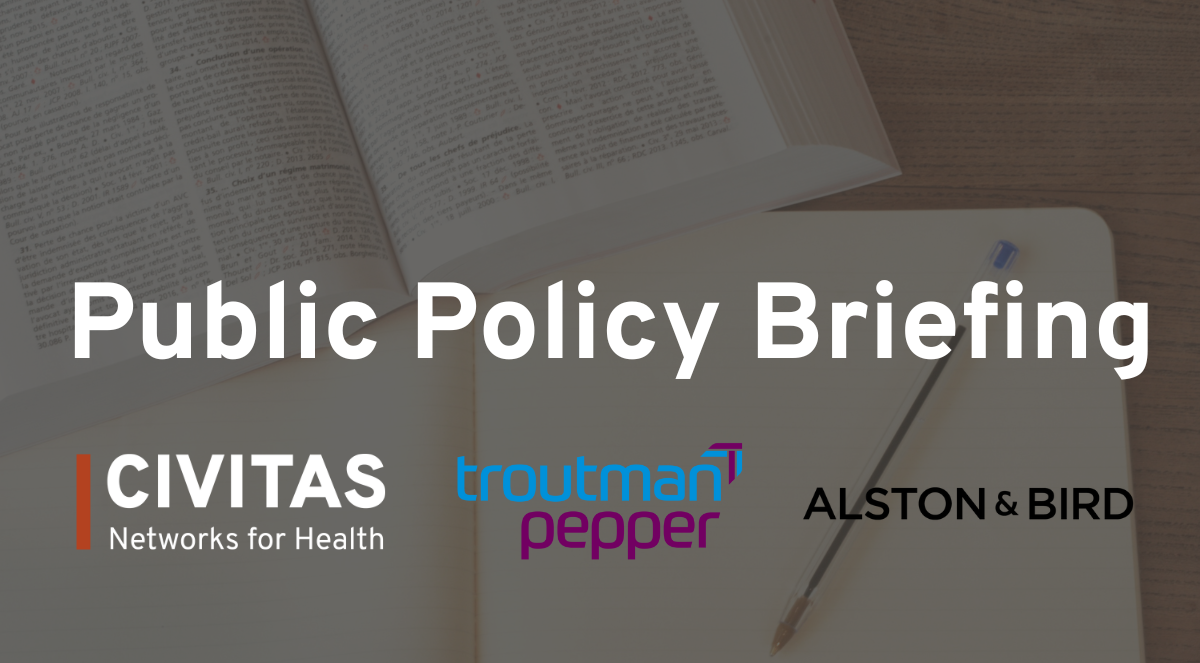November Network News | Financing Approaches to Address Social Determinants of Health via Medicaid Managed Care: A 12-State Review
November Network News
On Wednesday, November 15, Civitas Networks for Health members from across the country gathered virtually for our monthly all-member forum, Network News. Our spotlight presenters were Amanda Bank, MPH, Program Associate, and Diana Crumley, JD, MPAff, Associate Director of Delivery System Reform with the Center for Health Care Strategies (CHCS). They presented further details on CHCS’s report, Financing Approaches to Address Social Determinants of Health via Medicaid Managed Care: A 12-State Review.
Member Roundtable | Political Determinants of Health Series: Michigan Health Information Network - Session Two
Civitas Networks for Health Member Roundtable: Political Determinants of Health Series
Civitas members participated in a roundtable with guest presenters from Michigan Health Information Network to learn more about the political determinants of health, and how they worked with Congress in Michigan to support increased health data interoperability for the 12 tribes in the state. Here’s what we came away with:
- Data standards and producing accurate data are critically important to tribal health.
- Privacy and security are even more important when building trust.
- Trust cannot be overlooked with tribal populations and in working with tribal leaders; leaders need to know what you are doing with the data and that they still own the data.
- Having data at the point of care also helps with building trust.
- Work with tribes on specific use cases.
- In working with state representatives on tribal health, educate them about the populations they serve.
- Bring people together to problem solve, use real-life data to help people understand, and once there is shared understanding solutions will emerge.
In case you missed this event, or want to revisit the discussion, materials are now available!
Member Roundtable | Political Determinants of Health Series: Darthmouth Health - Session One
Civitas Networks for Health Member Roundtable: Political Determinants of Health Series
Thank you to all who participated in our member roundtable with guest presenters from Dartmouth Health in New Hampshire to learn more about the political determinants of health, how to build political will and savvy, and how to influence policy makers on important bills that ultimately impact the health of the communities we work with. In today’s case, we talked mostly about maternal health and the opioid crisis, but these takeaways broadly apply. Here’s what we came away with:
- To influence policy, coalition building is critical.
- Convene partners to build relationships and to educate on both baseline information and more complex topics. Let this be a catalyst for future discussion.
- Be sure that partners know what legislative opportunities exist and provide summaries of what is and isn’t happening.
- As you offer educational opportunities, be sure to measure increased understanding overtime.
- Building shared understanding increases the opportunity for greater influence.
- Think of the coalition, key partners, and legislators as an advocacy ecosystem.
- Remember to listen.
- Timely response is essential.
- Always be mindful of your political environment and when to use political capitol.
In case you missed this event, or want to revisit the discussion, materials are now available!
October Network News | Updates on Latest CMMI Model Developments and Latest HCPLAN Developments
October Network News
On Wednesday, October 18, Civitas Networks for Health members from across the country gathered virtually for our monthly all-member forum, Network News. Our spotlight presentation was brought to us by Kathryn Davidson, LCSW, Director of Learning and Diffusion Group with the Center for Medicare and Medicaid Innovation (CMMI). She shared updates on the latest CMMI models and regional learning, as well as the latest Health Care Payment Learning & Action Network (HCPLAN, or LAN) developments.
Streamlining Referrals to WIC with Increased Data Sharing
Health Data Utility Community Stories – insights into state, regional, and local efforts that illuminate how health data utilities are advancing community health improvement efforts. The stories are intended to make the Health Data Utility Framework come alive, showcasing data in action.
Written by Jolie Ritzo, VP of Strategy and Network Engagement, Civitas Networks for Health
Introduction to Health Data Utilities
Emerging health data utilities (HDUs) are popping up in states across the country by building off existing health data infrastructure to meet the need for more comprehensive data sharing. These efforts aim to bolster public health and advance health equity; address unmet health related social needs, facilitate the transition to value-based care, and improve quality and overall care coordination.

There are key characteristics that make HDUs different from health information exchanges (HIEs) and data collaboratives, though it is important to note that HDU effectiveness builds on years of strategic investments in HIEs’ existing technical, organizational, and trust infrastructure, and community governed data collaboratives and health improvement organizations. These key characteristics are:
- Neutrality and flexibility in meeting stakeholders’ goals
- Broad geography
- Cooperative state and local leadership and broad governance
- Leverage state and local authority
- Designated authority
- Multi-stakeholder, cross-sector participation
- Inclusive governance strategy
- Sustainable financing
- Modular infrastructure and advanced technical services
Communities across the country are at various stages of HDU development and are developing unique approaches to support data sharing, given local infrastructure, financial resources, public-private market forces, and their specific needs.
This HDU community story features Civitas members Serving Communities Health Information Organization (SCHIO), Health Improvement Partnership of Santa Cruz County (HIPSCC), and BluePath Health.
Responding to Community Needs and Meeting Stakeholder Goals
There is a large and persistent gap between eligibility and participation in the US Department of Agriculture’s Special Supplemental Nutrition Program for Women, Infants, and Children (WIC) throughout the country, to the extent that in 2020 only 50% of WIC-eligible women and children were enrolled in the program. Referrals are often paper based, relying on individuals to submit paperwork to their local agency, and recertification in the program requires submission of certain clinical data to stay in the program, meaning families must collect and share their information with their WIC agency.
To address this gap as it exists in their counties, WIC agencies pursued unique programs to solve the same issues. In Santa Cruz County, a coalition of four local stakeholders came together to improve referral workflow and information exchange for eligible enrollees. The partners included the Community Bridges, Serving Communities Health Information Organization (SCHIO), Health Improvement Partnership of Santa Cruz County (HIPSCC), and Unite Us. Further north, the San Francisco Department of Public Health Maternal Child and Adolescent Health Section—the local WIC program in San Francisco County—worked on its own internal approach.
Approaches to Cross-Sector Participation and Governance
HIPSCC, a nonprofit regional health improvement collaborative (RHIC), acted as the neutral convenor of the partners in Santa Cruz County. HIPSCC committed to bringing together key stakeholders serving WIC-enrolled and eligible area residents from different sectors on a regular basis to first review current workflows, and then to develop new streamlined workflows and solutions. Bringing key players into the same room allowed for the sharing of diverse perspectives to reach common ground and to bring about more successful solutions. Most importantly, it was not until the partners worked through individual workflows together that they could uncover, understand, and ultimately find ways around the most significant barriers.
In San Francisco, the Department of Public Health charted a solution on its own given local circumstances. While the community does not have the same HIE infrastructure as Santa Cruz County, San Francisco County benefits from a robust public hospital system and large network of community health centers that serve most Medicaid beneficiaries and WIC-eligible individuals. Most of these provider systems, as well as most other private providers and health systems in the county, have migrated to utilizing Epic for their EHR. This local landscape shaped the Department’s internal decision to adopt its own instance of Epic to support documentation, referrals, and data sharing.
Using Advanced Technical Infrastructure and Services
Though they serve communities in the technology capital of the world, the community health centers and public hospital systems sending most of the referrals to WIC in both counties were still relying on paper and faxes for referrals, placing the onus on families to manually submit applications. As a result, the community previously struggled to make referrals and connect families to needed services at a sufficient scale.
Through the collaborative efforts of the partners in Santa Cruz County, electronic referrals are now routed directly from providers to WIC agency staff in real time using Unite Us, whereby WIC staff can then contact families with pre-filled applications to drive increased program participation. Providers in Santa Cruz also have single sign-on access to SCHIO to access the clinical information needed for recertification. On the other hand, San Francisco’s approach leverages Epic for both the sending of referrals to the Department of Public Health and for WIC staff access to read-only clinical data.
Sustainability and Collaboration
With a goal of streamlining referral processes for families, providers, and WIC staff, these efforts have proven to be successful. The experiences of WIC staff and families were prioritized, and in doing so, increased the buy-in for accepting new processes. The workflow improvements also safeguard previous concerns around consent and WIC privacy policies by maximizing the impact of one-way data sharing with WIC programs, which helps build trust, reduce duplicative data collection efforts, and ensure eligible women and children are receiving critical services. These two approaches reflect how HDU development is a bottoms-up process that stems from on-the-ground, community needs. Though at present these two programs’ approaches differ, there is potential for them to learn from each other and potentially converge to reflect ongoing changes in needs and health data infrastructure, especially given state and federal investments in data-sharing infrastructure to support Medicaid transformation.
Both programs intend to continue utilizing and refining these approaches and share their learnings with other communities so that they can leverage their local resources, whether an HDU, EHR, or other technology, to support access to WIC nutrition and lactation benefits for their fellow community members. Both the California WIC Association and the National WIC Association have highlighted this work.
October Public Policy Briefing: FY2024 Funding Delays
October Public Policy Briefing
Unable to attend, or want to revisit the conversation? Materials are now available!
September Network News | Health IT End Users Alliance Consensus Statement on Data to Support Equity
September Network News
On Wednesday, September 20, Civitas Networks for Health members from across the country gathered virtually for our monthly all-member forum, Network News. Our spotlight presentation featured Andrew Tomlinson, AHIMA’s Director of Regulatory Affairs. He discussed the Health IT End Users Alliance Consensus Statement on Data to Support Equity.
Civitas Networks for Health Announces New Board of Directors Members for 2024
Civitas Networks for Health Announces New Board of Directors Members for 2024
Washington, DC – September 21, 2023 – Civitas Networks for Health today announced the results of its 2024 Board of Directors election, introducing both new and re-elected members who will play a pivotal role in steering the organization’s course over the next three years. These distinguished leaders have been carefully chosen by their peers to represent the best interests of Civitas’ 170+ member organizations, as well as continuing to support Civitas in sharing subject matter expertise, resources, and tools that help improve health and health care delivery nationwide.
The following individuals have been elected or re-elected for a 3-year term:
- Angie Bass, Executive Vice President, Chief Strategy Officer, Velatura (re-elected)
- Craig Behm, President and Chief Executive Officer, Chesapeake Regional Information System for our Patients (CRISP) (new Board member)
- Dan Porreca, President and Chief Executive Officer, HEALTHeLINK (re-elected)
- Kristin Paulson, Chief Executive Officer, Center for Improving Value in Health Care (new Board member)
“The robust participation in this election reflects our network’s dedication to advancing the work Civitas and its member organizations are doing at the local, state, and regional level,” said Lisa Bari, CEO, Civitas Networks for Health. “On behalf of the Civitas team, we’re excited to welcome both the newly elected and re-elected members to our Board. These individuals bring a wealth of experience and knowledge, as well as fresh perspectives, that will be instrumental in helping Civitas continue to grow and expand its offerings in the years to come.”
Civitas Networks for Health and its Board of Directors eagerly anticipate collaborating with Civitas’ members to continue improving health in communities through data-led, multistakeholder solutions in 2024 and beyond. Learn more about Civitas’ Board of Directors.
About Civitas Networks for Health
Civitas Networks for Health is a national nonprofit collaborative comprised of over 170 member organizations working to use health information exchange, health data, and multi-stakeholder, cross-sector approaches to improve health. We educate the private sector and policy makers on matters of interoperability, quality, coordination, health equity and cost-effectiveness of health care, and as a 501(c)(3) nonprofit organization, lead multi-site grant-funded programs and projects. We are proud to support local health innovators by amplifying their voices at the national level and increasing the exchange of valuable resources, tools, and ideas. To learn more, please visit www.civitasforhealth.org.
Recapping the Civitas 2023 Annual Conference: The Bridge Between Data and Doing
By: Lisa Bari and Jolie Ritzo, Photo Credit: Malik Chambers
The Civitas 2023 Annual Conference, held in National Harbor, Maryland, brought together health care leaders, experts, and stakeholders from across the country to share various perspectives on the future of health data exchange and health and health care transformation. With a focus on turning data into action, the conference delivered a wealth of insights, fostering collaborations and partnerships that will shape the health care implementation and interoperability landscape in the year to come.
Coming away from the annual conference, we wanted to share some insights we gathered from our many keynote, unconference, breakout, and stakeholder sessions held throughout our three and half days together.
Here is what we heard we need more of:
Data-Driven Transformation
No surprise here – the central theme of the conference revolved around the idea that data is not merely information; it is a catalyst for change. Civitas and its members have emerged as an important bridge between data and actionable solutions. The health improvement and health information exchange (HIE) industry rallied around the convergence of ideas and organizations, emphasizing the need for more robust data exchange to equip stakeholders and communities in addressing today’s most pressing health care challenges.
Collaboration Over Competition
There is immense power in collaboration. Various entities such as HIEs, emerging Health Data Utilities (HDUs), Regional Health Information Collaboratives (RHICs), All-Payer Claims Databases (APCDs), Community-Based Organizations (CBOs), and Quality Improvement Organizations (QIOs) highlighted instances of unity to tackle issues like maternal health, the opioid crisis, and unmet social needs. The message was clear: to succeed, we must uncover common interests and work together to meet community needs.
Public-Private Partnerships for Transformation
You may have seen the tagline, “Public Private Partnerships Inspire Transformation” on the conference t-shirts, but it is more than just a catchphrase. The importance of partnerships in navigating the complexities of the health care system was a recurring theme this year, with an emphasis that partnerships are not built overnight – they require time, intentionality, and an understanding of different perspectives. Civitas members and stakeholders must continue to actively seek common ground to drive transformation.
Patient-Focused Solutions and Patient Involvement in Conversations
We heard repeatedly that we need to continue to have more patients and caregivers as a part of these conversations – and we wholeheartedly agree. To bring a new perspective to the table this year, our team invited Erin Moore, a patient advocate and founder of Meanwhile Health, to represent the needs of patients and caregivers who were not present. She voiced valuable insights for organizations to integrate patients into their increasingly inclusive processes and governance structures. Suggestions such as RHICs, HIEs, and HDUs* taking an active role developing and sharing patient education resources that help patients in understanding how sharing their data can lead to more informed care and better patient outcomes, ensuring patients are included in developing data sets and data use that are relevant to addressing the challenges faced by patients and caregivers, and building community governance structure so the interests of patients are at the heart of the work being done. While we were excited to increase the patient perspective in our conference sessions, we have further to go and look forward to continuing meaningful discussions at the Civitas 2024 Annual Conference.
Nonprofit Data-Led Entities
The conference acknowledged the vital role played by nonprofit, community-governed, data-led organizations in national interoperability and health improvement. These entities offer neutral convening, data stewardship, advanced technology, community investment, and inclusive governance structures, building trust between stakeholders and community partners. The conference highlighted that the last mile of connectivity often occurs at the local community level, where innovation and implementation thrive. By acting locally, this work will be relevant to the unique needs of the people being served.
Privacy, Security, and Consent Management
With patients increasingly wanting access to their health data and national interoperability drawing closer, the importance of privacy, security, and consent management are paramount. Civitas members were encouraged to leverage existing infrastructure and expertise while exploring new possibilities with what information the data can uncover to transform care delivery in multiple settings. The Civitas national network of member organizations was seen as a platform for shared learning and recommendations on best practices for privacy, security, and consent. While we have work to do in this area, we are optimistic about an interoperable future.

Relentless Support for Public Health
The conference underscored the significance of supporting public health advancements, including workforce development, data modernization, messaging campaigns, and emergency preparedness. Civitas members and partners were encouraged to collaborate with local and state public health agencies to develop meaningful solutions.
Addressing SDOH and Social Care
Speakers and attendees reiterated that Social Determinants of Health (SDOH), and health related social needs are distinct concepts that require uniquely different levers. SDOH are addressed through policy, while social care and needs are met in service settings. A notable example was given in one of the keynote sessions, noting that someone being hungry is a need – to address it, you give them food. The SDOH policy lever to be pulled there is to ensure there is an affordable grocery store in their neighborhood. This underlines how effective change requires different approaches to address these distinctly different, but complementary, concepts.
Embracing Dialogue and Collaboration
Last, but certainly not least, following many years of isolation and uncertainty during the height of the pandemic, in-person gatherings are celebrated for their ability to foster dialogue, working sessions, and workshops. Participants enjoyed working together side-by-side to discuss solutions rather than watching traditional slide presentations. This collaborative spirit will set the stage for future conferences. We are excited to continue building this collaborative environment for our time together at #Civitas2024.
Join Us for #Civitas2024 in Detroit Next October
Mark your calendars for the Civitas 2024 Annual Conference taking place October 15-17, 2024, in Detroit, Michigan. We cannot wait to see you there.
Our Closing Thoughts on #Civitas2023
The Civitas 2023 Annual Conference was a testament to the dedication and innovation of our members and industry partners. The event highlighted the pivotal role all these organizations play in transforming health care by using data-driven solutions, collaboration, and patient engagement. Together we are better.
+++
*In the spirit of being inclusive, please find the definitions for RHIC, HIE, and HDU:
RHIC (Regional Health Improvement Collaborative): RHICs serve as a nonprofit neutral and trusted convenor of key health care stakeholders in their local community or defined geography. They must have multistakeholder governance which may include providers, payers, employers, patients, community organizations, and more -– to help plan, facilitate, and coordinate activities that support health care transformation efforts. Quality Improvement Organizations, Community Health Improvement and Data Collaboratives, and All-Payer Claims Databases may be considered RHICs.
HIE (Health Information Exchange): HIEs enable health care stakeholders to securely access electronic health information by moving clinical data across different health care settings and systems to improve the efficiency, quality, and safety of the patient’s care.
HDU (Health Data Utility): HDUs are models with cooperative leadership, designated authority, and advanced technical capabilities to combine, enhance, and exchange electronic health data across care and service settings for treatment, care coordination, quality improvement, and community and public health purposes. HDUs leverage existing infrastructure through collaboration with state and regional HIEs. In states that are larger in geography or population size, there is often increased complexity and need for coordination within and across regions as well as thoughtful attention to collaboration to meet local, regional, and state needs. Advanced technical services offered by HDUs support the electronic exchange of clinical, non-clinical, administrative, and public health data to address data challenges and achieve greater value for state agencies, payers, providers, community partners, and the public. HDUs integrate data from health-related networks, state agencies, community collaboratives,[1] all-payer claims databases, and other relevant health data registries. The broadened role of HDUs enable complex use cases using clinical and non-clinical data while ensuring the privacy and security of these data. You can learn more about HDUs by visiting our HDU Implementation Guide.
Breaking Down Barriers: How the University of Colorado Hospital is Improving Social Determinants of Health Data Sharing
In an era where health care is evolving to embrace a more holistic approach, the University of Colorado Hospital has emerged as a trailblazer in bridging the gap between medical care and social needs. With support from Civitas Networks for Health, a national network of multistakeholder, data-driven collaboratives, and The Gravity ProjectⓇ, a multi-stakeholder collaborative developing data standards for social needs data interoperability, the hospital is making strides to improve social determinants of health (SDOH) data sharing within its walls, ultimately breaking down barriers for patients to receive the social care they need and deserve. This collaborative effort reflects a comprehensive commitment to holistic patient well-being and is already yielding promising results.
Spearheaded by Tehreem Rehman, MD, MPH, former Emergency Physician for the University of Colorado Hospital and now practices at Mount Sinai Hospital, this project sets out to revamp the way SDOH data is collected, shared, and acted upon within the University of Colorado Hospital. With immense support from Civitas and the Gravity Project – providing technical assistance and tools such as social risk terminology value sets and an implementation guide – the initiative focuses on enhancing how social needs are screened, particularly in the emergency department (ED) setting. The overarching goal is to create a more efficient, effective, and equitable process for identifying and addressing patients' social care needs so health care professionals can integrate social workers faster and earlier.
Empowering Frontline Caregivers
One of the cornerstone principles driving this project is the empowerment of frontline caregivers, especially nurses. Recognizing that nurses often establish more substantial connections with patients, the initiative aims to tap into their insights and observations. By equipping nurses with the tools and autonomy to share valuable patient information with providers, social workers, and navigators, the project seeks to ensure a more comprehensive and patient-centered care approach. This paradigm shift in care coordination underscores the hospital's commitment to equitable, high-quality, value-based care delivery for every person who walks through their doors.
To achieve its ambitious goals, the University of Colorado Hospital has taken a multi-pronged approach. The project team has scrutinized existing workflows, identifying areas for improvement in screening and referrals and, in turn, streamlined flowsheets that integrate structured data with frontline insights. By embracing this approach, the hospital has paved the way for more efficient data sharing and documentation. Moreover, the hospital is collaborating closely with the Gravity Project to establish standardized terminology for key SDOH categories like food, housing, and utilities. This alignment ensures that data collection remains consistent and meaningful across various patient interactions, and can be replicated elsewhere.
Why Cross-Hospital Collaboration and Person-Centric Design Are Key to Success
Central to the success of this initiative is the unwavering commitment to early and frequent engagement of all team members, from administrative staff to social workers, nurses, residents, faculty, and executive leaders. The project exemplifies the importance of inclusive collaboration, valuing the diverse perspectives and expertise each team member brings to the table. By involving stakeholders from the outset and nurturing a culture of shared responsibility, the hospital has laid the groundwork for sustainable and impactful change.
In the digital age, the importance of user-friendly tools cannot be overstated. The University of Colorado Hospital recognizes that effective SDOH data sharing hinges on user-centric design. By ensuring that the system caters to the needs and preferences of providers, instead of hindering them with yet another platform to work in, the hospital is promoting seamless adoption and utilization within their existing systems. The project acknowledges the significance of patient engagement, aiming to make the tool accessible and easily updatable to reflect evolving patient circumstances and promote transparency.
Looking Ahead: What’s Next for the University of Colorado Hospital?
As the pilot project gains momentum, the University of Colorado Hospital remains committed to its vision of equitable care delivery for its patients. While it's too early to share definitive numbers, the hospital is closely monitoring screening rates and resource referrals to measure success and opportunities for the initiative over time. The ultimate aim is to double both metrics, providing a more comprehensive safety net for patients' social care needs. By aligning with the Gravity Project's national consensus-based SDOH data standards and harnessing the power of collaborative innovation, the University of Colorado Hospital is setting a transformative example for health care institutions nationwide.
The University of Colorado Hospital, through the Gravity Pilot, represents a pioneering initiative that is tirelessly working to enhance SDOH data sharing and dismantle barriers to social care in an interoperable and scalable way. This initiative exemplifies the value of interdisciplinary collaboration, patient-centered design, and a steadfast commitment to equitable care delivery. As the project continues to evolve and its impact becomes more evident, it stands as a testament to the transformative potential of addressing social determinants of health within the health care landscape.
With generous support from the Robert Wood Johnson Foundation (RWJF), Civitas Networks for Health has partnered with the Gravity Project® leadership, Health Level Seven® (HL7®), and various Civitas members to facilitate the dissemination and implementation of Gravity Project standards through Q4 2023. Our efforts involve engaging with national, regional, and local community partners to gain insights from and provide support for the Gravity pilot's work stream.
Support for this project was provided by RWJF. The views expressed here do not necessarily reflect the views of the Foundation.











